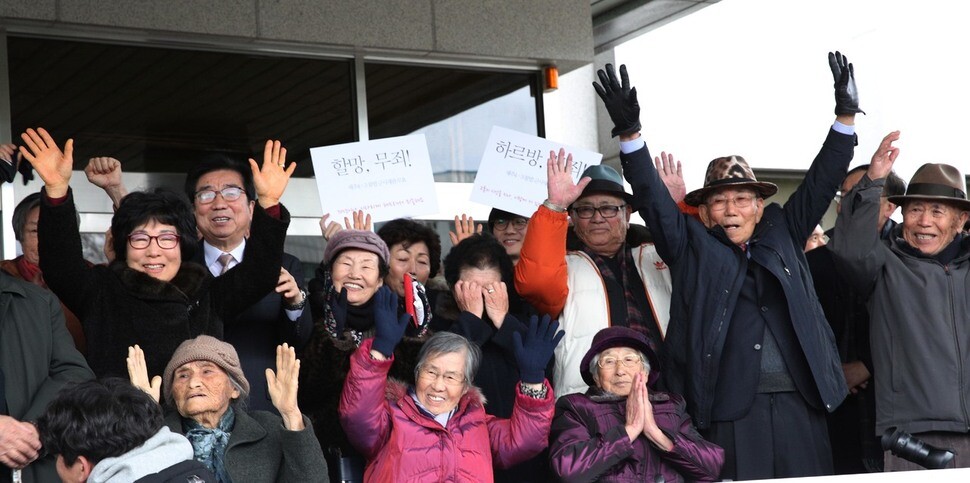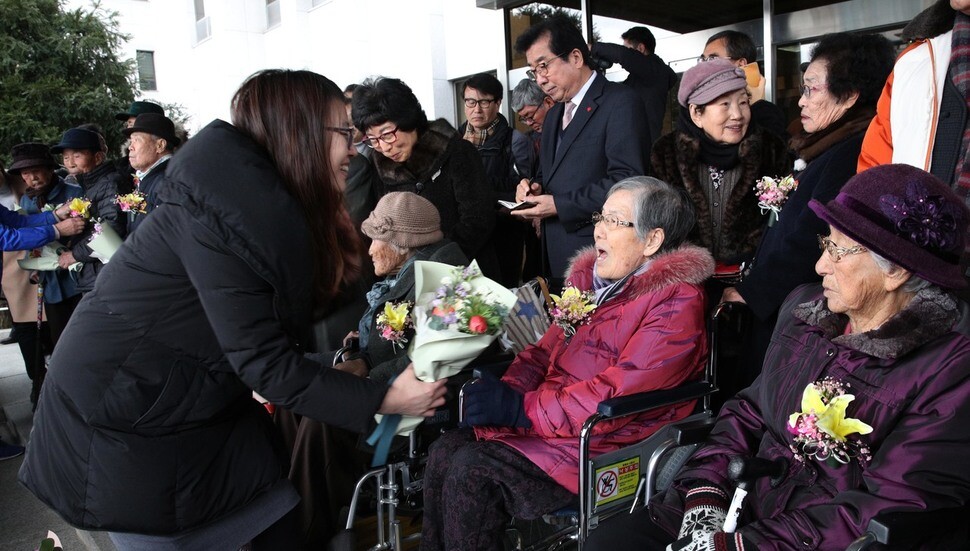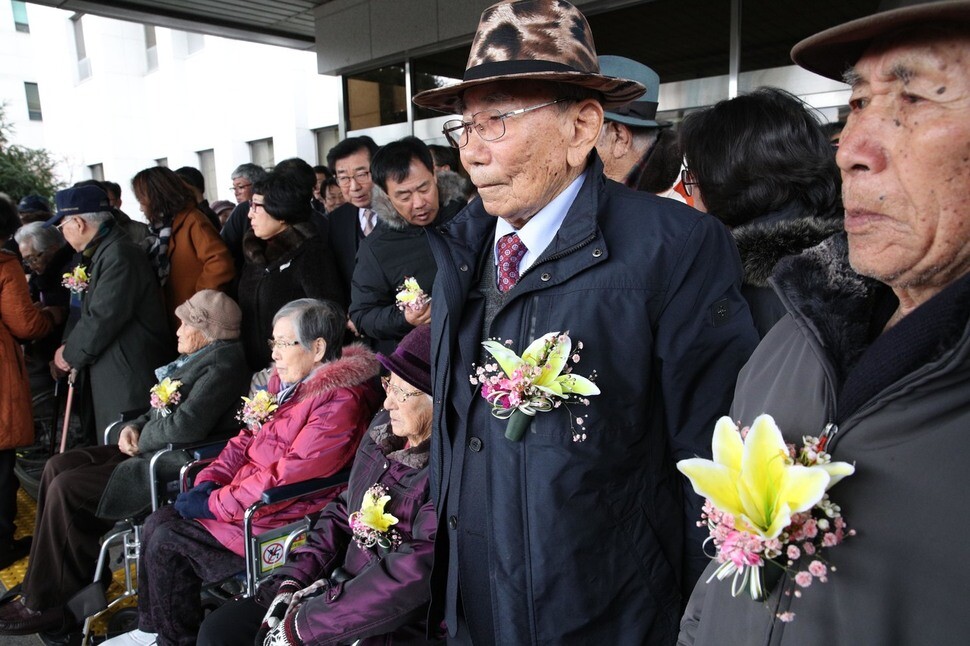hankyoreh
Links to other country sites 다른 나라 사이트 링크
Jeju court rules to erase red mark on Jeju Uprising prisoners

“You’ve gone through so much over all these years. I speak now on behalf of the court. Judicial decision: all indictments against the defendants are hereby dismissed.”
It was 1:41 pm on Jan. 17 in room 201 of Jeju District Court in Jeju City. Yang Geun-bang, 86, cocked his head quizzically when senior judge Hon. Jegal Chang first spoke the words pronouncing the indictments dismissed.
“That’s the same as an acquittal,” his attorney explained. “We won.” Only then did a bright smile come over Yang’s face.
“Thank you. Thank you,” he said. Applause rang out from the gallery. Oh Hee-choon, 86, who had been sitting at the very front of the gallery seats listening intently to the judges’ words, began to tear up. Wordlessly dabbing her eyes with a white handkerchief, Oh said, “After carrying such a heavy weight for so long, it’s now been lifted. That’s why I’m crying. These are happy tears – the tears of no longer being a ‘criminal’ [. . .]. ” Oh joined other victims in a “hurrah” at a press conference after the hearing.
On Jan. 18, the second criminal division of Jeju District Court under judge Hon. Jegal Chang ruled to dismiss all charges in a retrial requested by 18 former prisoners who had served sentences of one to 20 years after being referred for military court-martial on charges including “rebellion” during the Jeju Uprising of 1948–49 (known locally as “Jeju April 3”). The court’s determination was that the indictments were invalid because the victims had been referred to trial without being told exactly what they were accused of. Following their convictions, Yang and the other victims had been sent outside of their home island of Jeju to serve in prisons in other parts of South Korea.

The reasons cited by the court for declaring the indictments null and void were the “lack of specificity in the indictments” and “failure to comply with military court-martial referral procedures.”
“Prisoner registers, military enforcement directives, and other related documents listed only the charge and the relevant legal provision. No arraignment notices or verdicts exist to confirm the charges on which [the defends] were court-martialed,” the court said.
“The defendants have consistently testified that they do not know what alleged crime they were being tried for,” it also noted.
In particular, the court concluded that proper investigations and trials did not and could not have taken place in view of the guilty verdicts produced against 2,530 people in a short period of time during courts-martial associated with the Jeju Uprising.
“Twelve hearings for 871 people took place over a space of 25 days at the time, another 10 hearings for 1,659 people over a period of 15 days,” the court observed.
“It is impossible to conclude that preliminary investigations and indictment delivery procedures were properly observed in referring such a large number of people en masse for courts-martial over a short time frame,” the court said. It went on to cite a Jeju April 3 investigation report, which stated that military authorities were “believed to have previously established their rulings based on the opinions of police at the time.”

Surviving former prisoners began assembling in the Jeju District court lobby around noon that day. Many were infirm due to their advanced age and relied on canes and wheelchairs to arrive at the court. The children of Jeong Gi-seong, 97, and Hyeon Chang-yong, 87, attended the trial on behalf of their parents, who are currently in nursing homes. Visibly tense as the moment of the ruling drew closer, the former prisoners were beaming as they stood in front of the courthouse ten minutes later following the judge’s pronouncement. In front of them, they held a banner reading, “We are not ‘criminals’ anymore.”
“How good does it feel when you’ve been freed from a mangsari?” asked Kim Pyeong-guk, 89, referring to the type of net used by Jeju’s women divers.
“The red mark has been erased from our names, and all the stigma of having been in prison has been lifted. That’s the greatest relief,” she said, smiling broadly with a bouquet of flowers in her hands.
Park Dong-su, 86, recalled that he had “suffered innocently through all sorts of torture.”
“I endured life in prison without the kind of trial we saw today. That left me with bitterness in my heart, and now I have been acquitted. I don’t what else to say,” he added, his voice trailing off.
The court previously decided to hold the re-trials in September of last year; prosecutors made the decision not to object.
“This goes far beyond an exoneration, in that it confirms the general illegality that took place in the military courts-martial at the time,” said attorney Im Jae-seong of the law firm Haemaru.
“We plan to file suit to request damages from the state and examine a re-trial request for 12 other surviving former prisoners,” Im added.
By Ko Han-sol, staff reporter
Please direct comments or questions to [english@hani.co.kr]

Editorial・opinion
![[Column] Park Geun-hye déjà vu in Yoon Suk-yeol [Column] Park Geun-hye déjà vu in Yoon Suk-yeol](https://flexible.img.hani.co.kr/flexible/normal/500/300/imgdb/original/2024/0424/651713945113788.jpg) [Column] Park Geun-hye déjà vu in Yoon Suk-yeol
[Column] Park Geun-hye déjà vu in Yoon Suk-yeol![[Editorial] New weight of N. Korea’s nuclear threats makes dialogue all the more urgent [Editorial] New weight of N. Korea’s nuclear threats makes dialogue all the more urgent](https://flexible.img.hani.co.kr/flexible/normal/500/300/imgdb/original/2024/0424/7317139454662664.jpg) [Editorial] New weight of N. Korea’s nuclear threats makes dialogue all the more urgent
[Editorial] New weight of N. Korea’s nuclear threats makes dialogue all the more urgent- [Guest essay] The real reason Korea’s new right wants to dub Rhee a founding father
- [Column] ‘Choson’: Is it time we start referring to N. Korea in its own terms?
- [Editorial] Japan’s rewriting of history with Korea has gone too far
- [Column] The president’s questionable capacity for dialogue
- [Column] Are chaebol firms just pizza pies for families to divvy up as they please?
- [Column] Has Korea, too, crossed the Rubicon on China?
- [Correspondent’s column] In Japan’s alliance with US, echoes of its past alliances with UK
- [Editorial] Does Yoon think the Korean public is wrong?
Most viewed articles
- 1‘We must say no’: Seoul defense chief on Korean, USFK involvement in hypothetical Taiwan crisis
- 2N. Korean delegation’s trip to Iran shows how Pyongyang is leveraging ties with Moscow
- 3‘Weddingflation’ breaks the bank for Korean couples-to-be
- 4Korea sees more deaths than births for 52nd consecutive month in February
- 546% of cases of violence against women in Korea perpetrated by intimate partner, study finds
- 6[Column] Park Geun-hye déjà vu in Yoon Suk-yeol
- 7Will NewJeans end up collateral damage in internal feud at K-pop juggernaut Hybe?
- 8Amnesty notes ‘erosion’ of freedom of expression in Korea in annual human rights report
- 9[Editorial] New weight of N. Korea’s nuclear threats makes dialogue all the more urgent
- 10[Column] Yoon’s first 100 days should open our eyes to pitfalls of presidential system